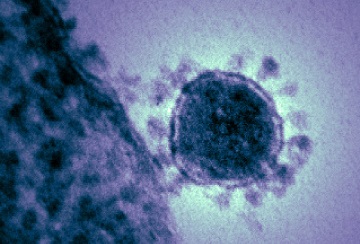SARS-CoV-2 News: Researchers from University of Missouri Discover That Tight Junction Protein Occludin Is An Internalization Factor For SARS-CoV-2 Infection!
SARS-CoV-2 News - Tight Junction Protein Occludin Apr 20, 2023 2 years, 9 months, 3 weeks, 3 days, 15 minutes ago
SARS-CoV-2 News: A new study by researchers from University of Missouri, Columbia-USA has found that that tight junction protein Occludin is an internalization factor for SARS-CoV-2 infection and mediates virus cell-to-cell transmission.

SARS-CoV-2, the virus responsible for COVID-19, spreads easily from person to person. Understanding how it enters and infects cells is crucial for developing effective treatments and preventive measures.
The study team discovered that a protein called occludin (OCLN), which is part of tight junctions between cells, plays a critical role in SARS-CoV-2 infection and transmission.
Background on SARS-CoV-2 Infection
To infect a person, the SARS-CoV-2 virus first needs to bind to a target cell. The virus's spike protein attaches to a receptor called angiotensin-converting enzyme 2 (ACE2) on the cell surface. This binding process triggers a series of events that allow the virus to enter the cell and release its genetic material, ultimately leading to infection as been covered in various past studies and
SARS-CoV-2 News reports.
As the virus spreads from cell to cell, it can cause the cells to fuse together, forming larger, infected cell masses called syncytia. This process helps the virus spread more easily and avoid detection by the immune system. However this leads to disease severity in the infected individuals.
The Role of Occludin
Tight junctions are structures found between cells that help maintain the integrity of tissues and act as a barrier against pathogens. OCLN is a key component of these tight junctions and has been found to play a role in the entry of other viruses, such as hepatitis C and West Nile virus. the study team speculated that OCLN might also be involved in SARS-CoV-2 infection and transmission.
The study findings revealed that OCLN is indeed crucial for SARS-CoV-2 infection. When the levels of OCLN in cells were reduced, the virus had a harder time entering the cells and forming syncytia. Conversely, when OCLN levels were increased, the virus entered the cells more easily and spread more efficiently.
Importantly, the study team found that OCLN directly interacts with the SARS-CoV-2 spike protein, suggesting that the virus might use OCLN as an internalization factor to help it enter cells and spread between them.
The study findings also showed that different SARS-CoV-2 strains, including the alpha, beta, gamma, delta, kappa, and omicron variants, all depend on OCLN for cell-to-cell transmission. However, the extent to which these strains cause syncytium formation varies between them.
Implications of the Research
Understanding the role of OCLN in SARS-CoV-2 infection and transmission has several implications. First, it provides valuable insights into the mechanisms that the virus uses to enter cells and spread, which can inform the development of new treatments and preventive measures. Second, it highlights the importance of OCLN as a potential target for antiviral therapies that could block the virus's ability to enter and infect cells.
&
nbsp;
However, more research is needed to fully understand how OCLN interacts with the virus and how it contributes to infection and transmission. For example, it is not yet clear why SARS-CoV-2 infection causes a decrease in OCLN production and stability, or how this might be related to the virus's ability to spread between cells. Further studies are also needed to explore the potential of OCLN as a target for antiviral drugs or other interventions.
Conclusion
This research has shed light on the important role of the OCLN protein in SARS-CoV-2 infection and transmission. By understanding how the virus interacts with host proteins like OCLN, scientists can better understand the mechanisms of viral infection and develop more effective treatments and prevention strategies.
The study findings were published in the peer reviewed journal: PNAS
https://www.pnas.org/doi/10.1073/pnas.2218623120
For the latest
SARS-CoV-2 News, keep on logging to Thailand Medical News.
